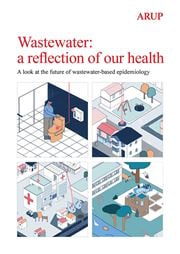 Lucy Chakaodza
UKIMEA Press Office,London
Lucy Chakaodza
UKIMEA Press Office,London
Pioneering services, spaces and urban infrastructure could be developed to respond to rapid health shocks or enable preventative health measures in the future, through use of valuable wastewater monitoring data, finds a new study by professional services firm Arup.
Wastewater monitoring or wastewater-based epidemiology (WBE) offers a new and honest source of health data that public health practitioners could utilise, alongside current datasets to monitor impacts of healthcare practices or predict future trends.
The COVID-19 pandemic has reminded us of the importance and impact of public health. In these unprecedented times, governments across the world have been looking to a new source of health data to track the viral spread: wastewater.
Through monitoring biomarkers, found in sewage, wastewater-based epidemiology (WBE) can give an indication of human health. Since humans can begin secreting biomarkers into sewage days before COVID-19 symptoms develop, WBE has been used, throughout the pandemic, as an early warning system to identify viral hotspots before this was visible in clinical data.
Combined with other data sources, WBE can begin to tell contextual and comparative stories about our health across different geographies and demographics.
Wastewater: a reflection of our health report published by Arup with input from academics at Bath and Bangor universities, UK Centre for Ecology & Hydrology in addition to Devon County Council, explores what the future for WBE might hold, through a series of speculative scenarios outlining potential use cases for WBE data and their ramifications.

